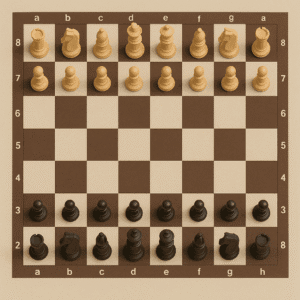
World Chess Championship 2024:
In the world of chess, the 2024 World Chess Championship, which took place in Singapore from November 25 to December 12, was a landmark event. By defeating China’s Ding Liren, the current champion, 7½–6½, the 18-year-old Indian prodigy Gukesh Dommaraju secured the title. In addition to making Gukesh the youngest unchallenged world chess champion, this triumph highlighted the growing influence of Asian chess players worldwide.
A Historic Matchup
Two Asians competed in the World Chess Championship for the first time in 138 years. Gukesh Dommaraju, a fierce opponent, faced off against Ding Liren, the 2023 champion. The game was played in the Equarius Hotel, Resorts World Sentosa, Singapore, which offered a calm yet competitive setting for this important encounter. The championship’s US$2.5 million prize fund demonstrated the event’s importance and widespread appeal.
The Road to the Championship
Ding Liren: The Defending Champion
Ding Liren ascended to the world champion status in 2023 after defeating Ian Nepomniachtchi. Known for his deep strategic understanding and calm demeanor, Ding had been a formidable presence in the chess world. His journey to the 2024 championship was marked by rigorous preparation and a determination to retain his title.
Gukesh Dommaraju: The Challenger
Gukesh’s rise in the chess world has been nothing short of meteoric. Born on May 29, 2006, in Chennai, India, he began learning chess at the age of seven. His dedication and talent quickly became evident as he amassed numerous accolades in youth championships. In 2019, at just 12 years, 7 months, and 17 days old, Gukesh became the second youngest grandmaster in history. His relentless pursuit of excellence led him to win the Candidates Tournament in April 2024, earning him the right to challenge Ding Liren for the world title.
The Championship Unfolds
Game 1: A Strong Start for Ding
The championship commenced with Ding Liren showcasing his experience and preparation. He secured a victory in the first game, setting a challenging tone for the young challenger. This initial win demonstrated Ding’s intent to defend his title vigorously.
Games 2–6: A Series of Draws
The subsequent games saw both players engaging in intense battles, each unwilling to concede an advantage. Games 2 through 6 resulted in draws, reflecting the high level of preparation and the evenly matched skills of the competitors.
Game 7: Gukesh Strikes Back
In the seventh game, Gukesh capitalized on a slight inaccuracy from Ding, securing his first victory in the match. This win not only leveled the score but also showcased Gukesh’s resilience and ability to seize critical moments.
Games 8–13: Tension Mounts
The middle phase of the championship was characterized by cautious play from both sides. With the score tied, neither player wanted to risk unnecessary complications. This period of the match was marked by strategic maneuvers and deep calculations, resulting in a series of draws.
Game 14: The Decisive Moment
The final game of the championship proved to be the most dramatic. Both players entered the game with the knowledge that a win would secure the title. The game unfolded into a tense battle, with both sides making critical decisions under immense pressure. In a dramatic turn of events, Ding Liren made a blunder in a complex position, allowing Gukesh to simplify into a winning endgame. Gukesh’s precise play in this critical moment secured his victory, making him the youngest undisputed world chess champion.

The Effects of Gukesh’s Win
Gukesh‘s victory has had a significant effect on the chess community worldwide, especially in India. A new generation of chess players has been inspired by his triumph, which has rekindled interest in the game nationwide. His accomplishment has been praised by the Indian government and other chess federations, which intend to increase funding for chess facilities and training initiatives.
Gukesh’s triumph has changed the nature of competitive chess on the global scene. His youthful exuberance and creative style of play have brought new ideas to elite chess tournaments. Gukesh is anticipated to impact the development of chess tactics as the new world champion and motivate up-and-coming players everywhere.
The Future of Chess
The 2024 World Chess Championship has brought attention to how chess is evolving, with younger players becoming more well-known and taking on more seasoned grandmasters. This change reflects a larger pattern of young people succeeding in sectors that have historically been controlled by experience. The championship has also highlighted how crucial mental toughness, flexibility, and lifelong learning are to attaining success.
The chess community is looking forward to Gukesh’s future contributions to the game as he begins his reign as the world champion. His ascent from a teenage chess fan to the highest level of achievement is evidence of commitment, zeal, and the boundless capacity of the human intellect.
World Chess Championship 2024 Winners List
| Category | Winner | Runner-up | Final Score |
|---|---|---|---|
| World Chess Champion | Gukesh Dommaraju (India) | Ding Liren (China) | 7½ – 6½ |
| Candidates Tournament Winner | Gukesh Dommaraju (India) | Ian Nepomniachtchi (Russia) | – |
| Women’s World Chess Champion | Ju Wenjun (China) | Lei Tingjie (China) | 6½ – 5½ |
| World Rapid Chess Champion | Magnus Carlsen (Norway) | Nodirbek Abdusattorov (Uzbekistan) | – |
| World Blitz Chess Champion | Magnus Carlsen (Norway) | Hikaru Nakamura (USA) | – |
| World Junior Chess Champion | Marc’Andria Maurizzi (France) | Volodar Murzin (Russia) | – |
World Chess Championship: All-Time Winners & Runners-Up
| Year | Winner | Runner-Up | Final Score |
|---|---|---|---|
| 1886 | Wilhelm Steinitz (Austria) | Johannes Zukertort (UK) | 10–5 |
| 1889 | Wilhelm Steinitz (Austria) | Mikhail Chigorin (Russia) | 10½–6½ |
| 1891 | Wilhelm Steinitz (Austria) | Mikhail Chigorin (Russia) | 12½–10½ |
| 1894 | Emanuel Lasker (Germany) | Wilhelm Steinitz (Austria) | 12–7 |
| 1897 | Emanuel Lasker (Germany) | Wilhelm Steinitz (Austria) | 10–2 |
| 1907 | Emanuel Lasker (Germany) | Frank Marshall (USA) | 11½–3½ |
| 1910 | Emanuel Lasker (Germany) | Carl Schlechter (Austria) | 5–5 |
| 1921 | José Raúl Capablanca (Cuba) | Emanuel Lasker (Germany) | 9–5 |
| 1927 | Alexander Alekhine (France) | José Raúl Capablanca (Cuba) | 6–3 |
| 1935 | Max Euwe (Netherlands) | Alexander Alekhine (France) | 15½–14½ |
| 1937 | Alexander Alekhine (France) | Max Euwe (Netherlands) | 15½–9½ |
| 1948 | Mikhail Botvinnik (USSR) | Vasily Smyslov (USSR) (Round Robin) | – |
| 1951 | Mikhail Botvinnik (USSR) | David Bronstein (USSR) | 12–12 |
| 1954 | Mikhail Botvinnik (USSR) | Vasily Smyslov (USSR) | 12–12 |
| 1957 | Vasily Smyslov (USSR) | Mikhail Botvinnik (USSR) | 12½–9½ |
| 1958 | Mikhail Botvinnik (USSR) | Vasily Smyslov (USSR) | 12½–10½ |
| 1960 | Mikhail Tal (USSR) | Mikhail Botvinnik (USSR) | 12½–8½ |
| 1961 | Mikhail Botvinnik (USSR) | Mikhail Tal (USSR) | 13–8 |
| 1963 | Tigran Petrosian (USSR) | Mikhail Botvinnik (USSR) | 12½–9½ |
| 1969 | Boris Spassky (USSR) | Tigran Petrosian (USSR) | 12½–10½ |
| 1972 | Bobby Fischer (USA) | Boris Spassky (USSR) | 12½–8½ |
| 1975 | Anatoly Karpov (USSR) | Bobby Fischer (USA) (Fischer forfeited) | – |
| 1978 | Anatoly Karpov (USSR) | Viktor Korchnoi (USSR) | 16½–15½ |
| 1981 | Anatoly Karpov (USSR) | Viktor Korchnoi (USSR) | 11–7 |
| 1985 | Garry Kasparov (USSR) | Anatoly Karpov (USSR) | 13–11 |
| 1993 | Garry Kasparov (Russia) | Nigel Short (UK) | 12½–7½ |
| 2000 | Vladimir Kramnik (Russia) | Garry Kasparov (Russia) | 8½–6½ |
| 2007 | Viswanathan Anand (India) | Vladimir Kramnik (Russia) | 6½–4½ |
| 2013 | Magnus Carlsen (Norway) | Viswanathan Anand (India) | 6½–3½ |
| 2016 | Magnus Carlsen (Norway) | Sergey Karjakin (Russia) | 9–7 |
| 2021 | Magnus Carlsen (Norway) | Ian Nepomniachtchi (Russia) | 7½–3½ |
| 2023 | Ding Liren (China) | Ian Nepomniachtchi (Russia) | 9½–8½ |
| 2024 | Gukesh Dommaraju (India) | Ding Liren (China) | 7½–6½ |
🔥 Related Posts

How to Play Chess: A Beginner’s Guide to Mastering the Game

Chess Pieces: A Deep Dive into the Game and Its Strategy

The Majesty of the King Chess Piece: Strategies, Games, and Symbolism
Valorant Tracker – What It Is, Why Players Use It & the Risks Involved

Is Chess a Sport? Exploring the Debate
